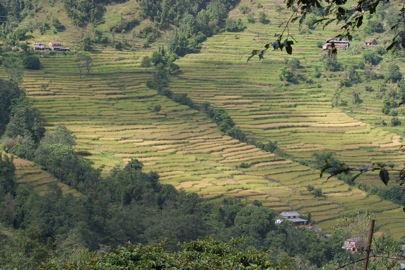From our friend Ola Westengen.
Thanks to the announcement on this blog I learned that the Linnean Society were having a meeting entitled “The Future of Plant Genetic Resources.” When I saw the list of speakers a couple of names triggered me to search the dark corners of my budget, were I found just enough for a cheap return ticket to London. It was definitely worth the trip. I owe you a report, and I actually intended to write one up on the flight back, but the wine reception at the end of the meeting took its toll on my concentration.
So now, three days later, instead of decoding my notes from the many excellent talks, I’ll just direct you to the “Abstract book.” I wish I also could show you some of the great pictures in Sandra Knapp’s presentation, such as the one where Professor Jack Hawkes crosses an Andean river with the water waist high — still with his hat and tie on. Jack Hawkes definitely deserves his prominent place in the PGR pantheon, and his formative role for collecting, taxonomy, conservation and policy in this field was highlighted by several speakers. Quite a few, but not the majority, of the talks centered around the Solanum genus and the potatoes. The taxonomists are still arguing about splitting and lumping in the cultivated potato’s extended family, but no one disputes the important contribution made by Jack Hawkes, which still seems to serve as the baseline. Molecular markers are elusive stuff compared to the morphological characters recognized by the trained eye of an aficionado.
Actually, traditional molecular marker studies took a beating from more than one speaker, including by the new King of Corn, Ed Buckler, on some pretty breathtaking methods and results with implications for genetics that go far beyond that even the world’s most produced cereal. Did you know that two lines of maize are in average as divergent from each other as humans are from chimpanzees? Think about that the next time you eat popcorn at the zoo.
The Scottish Crop Research Institute was represented with three good talks, two on potatoes and one on an awesome barley landrace study done with ICARDA. The results will soon be published, and if you fancy beer and other barley products you should keep an eye on their website. PGR collectors, like few other scientists, can claim that their work lives on after they are gone. While Jack Hawkes’ legacy is indisputable, his potatoes are still flowering in the fields of the world’s genbanks. The Commonwealth Potato Collection sports a great website where these flowers can be seen online. Some of you will appreciate their use of Google Earth on their accession list. Check out the abstracts for more. Thanks to the Linnean Society for organizing this inspiring meeting and thanks to the Agricultural Biodiversity Weblog for making it known! At least to me.
